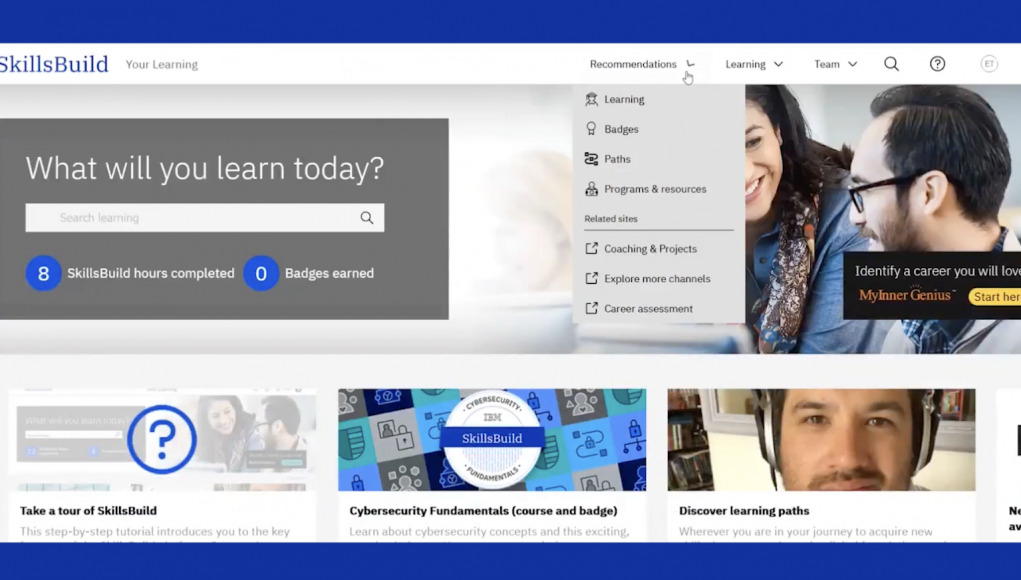- Taxonomic straightjackets — we don't tend to recognise everything that makes for a valuable employee or colleague. There are behaviours that are valuable, as well esoteric knowledge and skills that don't fit into pre-defined taxonomies.
- Hiring is broken — this deserves a whole other blog post, but current systems tend to automate the very things that need a human touch. Hence, applicants spend an inordinate amount of time searching for and applying for jobs, while algorithms reject people who would be a perfectly good fit.
- References are outdated — one organisation I used to work for stopped taking references because a) in most jurisdictions, it's against the law to make negative comments, and b) they're generally unreliable. Yet the whole system is predicated on them. Endorsements and recommendations based on network relationships are much more valuable.
Don't tell me that hiring isn't broken
Despite the great work being done around Open Recognition, the main use case for digital credentials remains helping people get jobs. Which means that I’ve spent over a decade, on and off, being forced to think about the interface between people wanting to be hired, and those who want to hire those people.
This article talks about job seekers using AI tools to automate applications. In the example given, the system used sent 5,000 applications on behalf of someone, which landed them 20 interviews. They’d previously got the same number of interviews from manually applying to 200-300 jobs, but it was a lot less work.
Credentials are always a form of arms race if we’re always stacking them vertically like the sheets of paper in the image below. Open Recognition allows us to think about a more wide-ranging set of skills, but it requires people in HR departments to think differently. Sometimes it’s about quality over quantity.

Many job seekers will understand the allure of automating applications. Slogging through different applicant tracking systems to reenter the same information, knowing that you are likely to be ghosted or auto-rejected by an algorithm, is a grind, and technology hasn’t made the process quicker. The average time to make a new hire reached an all-time high of 44 days this year, according to a study across 25 countries by the talent solutions company AMS and the Josh Bersin Company, an HR advisory firm. “The fact that this tool exists suggests that something is broken in the process,” Joseph says. “I see it as taking back some of the power that’s been ceded to the companies over the years.”Source: AI bots can do the grunt work of filling out job applications for you | Ars TechnicaRecruiters are less enamored with the idea of bots besieging their application portals. When Christine Nichlos, CEO of the talent acquisition company People Science, told her recruiting staff about the tools, the news raised a collective groan. She and some others see the use of AI as a sign that a candidate isn’t serious about a job. “It’s like asking out every woman in the bar, regardless of who they are,” says a recruiting manager at a Fortune 500 company who asked to remain anonymous because he wasn’t authorized to speak on behalf of his employer.
Other recruiters are less concerned. “I don’t really care how the résumé gets to me as long as the person is a valid person,” says Emi Dawson, who runs the tech recruiting firm NeedleFinder Recruiting. For years, some candidates have outsourced their applications to inexpensive workers in other countries. She estimates that 95 percent of the applications she gets come from totally unqualified candidates, but she says her applicant tracking software filters most of them out—perhaps the fate of some of the 99.5 percent of Joseph’s LazyApply applications that vanished into the ether.
Oh great, another skills passport
I’ve spent the last 12 years working in the ecosystem around Open Badges, which provides an alternative accreditation system. It didn’t come out of thin air, and before this there was plenty of work around e-portfolios. Next up we’ve got Verifiable Credentials which allow for lots of things, including endorsement.
Frustratingly, over the past couple of decades, people several steps removed from actual jobs markets and education systems decide to weigh in. Inevitably, they use the metaphor closest to hand, which tends to be a ‘passport’.
This not only is the wrong metaphor, but it diverts money and attention from fixing some of the real issues in the system. I’d suggest that these are at least threefold:

The passport system is intended to help workers advertise their full range of qualifications, micro-credentials, prior learning, workplace experience and general capabilities.Source: National Skills Passport: Government aims to connect workers and employers | SBS NewsBusinesses, unions, tertiary institutions and students are among those the federal government says will be consulted about the initiative.
Treasurer Jim Chalmers said the goal was to make it easier for employers to find highly-qualified staff and for workers to have their qualifications recognised.
“We want to make it easier for more workers in more industries to adapt and adopt new technology and to grab the opportunities on offer in the defining decade ahead of us,” Chalmers said.
If your heart isn’t it, it’s probably because there’s no heart anywhere in the process
One thing I’ve learned spending over a decade thinking about Open Badges and alternative credentials is that hiring is broken. Although there are mitigations and workarounds — some of which I’ve implemented when hiring a team and helping others do so — the whole thing is a dumpster fire.
This article by Paul Fuhr discusses the horror show that is job hunting in the age of platforms such as Indeed. He does a great job of showing how automated and dehumanising the whole hiring process is. Platforms are more focused on user engagement than genuinely aiding job seekers; applicants are reduced to mere data points.
Not only that, but the lack of human-centricity to the whole thing fails to accommodate those with non-linear careers while simultaneously trivialising the job search process. Unsurprisingly, he’s calling for root-and-branch reform of the current job market. I can’t help but think that badges and alternative credentials can make the whole thing more transparent and fair, moving away from automated metrics.
I’ve applied for (quite literally) thousands of jobs. Very quickly, I went from being surgically precise about job applications to taking a shotgun-blast approach to it all, spraying applications out in every direction. I’ve clicked the “Submit” button on countless career sites. I’ve created four different versions of my resume. I’ve spent more time on LinkedIn than any other site, too, though I suspect Reddit is happy to have some server bandwidth back.Source: Why Resumes Are Dead & How Indeed.com Keeps Killing the Job Market | Paul FuhrSearching for a steady job is a disheartening and depressingly tedious affair, but it doesn’t have to be. If I’m qualified for anything at the moment, though, it’s being qualified to weigh in on the contemporary job-search experience. I know what it is, what it isn’t, what it pretends to be, why it no longer works, and what needs to change. And thanks to a year-plus of trying to find consistent work, it’s no longer about connecting me with the job of my dreams — it’s about connecting me with my dream of simply having a job.
[…]
Machine learning, AI, automation, yadda yadda yadda. I get it. I understand the “why” of automating the hiring process; I even think it can be a helpful (jargon alert) “arrow in the quiver” for HR. I can’t even imagine a single HR specialist being tasked to locate the right candidate from a huge field of applicants for one job, let alone fifteen jobs at once. That’s like finding a needle in a stack of needles. It’d be paralyzing.
That said, hiring managers and job seekers have arrived at a truly dangerous intersection. Employers have allowed automation to creep in and govern so much of the HR process that it threatens to ignore the whole…well, you know, human part of it all. And some companies insist on doubling-down on this façade; I’ve visited a shocking number of sites that pretend to have an actual human person ready to chat with you (certainly not a bot!), as if they’re impossibly waiting 24/7 to answer your questions.
We’re at a maddeningly mindless moment when it comes to finding employment, but it’s one that could be repaired with some maddeningly simple ideas. For starters, just bring back some humans. Robots can parse your past and distill you down into data, but they’ll never make a genuine connection or get a sense of you are. Also, simplicity works both ways: it benefits the applicant as much as an HR specialist.
Hacking the application process
It’s perhaps a massive over-simplification, but my understanding of the so-called ‘skills gap’ is that two things are happening.
The first is a long-term trend for employers expecting to have to spend zero dollars on training for the people they hire.
The second is the use of algorithmic scanning of CV-scanning software to reject the majority of applicants. Not surprisingly, although it might make recruiters' jobs a bit more manageable, it’s not great for diversity or finding people who haven’t done that exact job before.
Software can also disadvantage certain candidates, says Joseph Fuller, a management professor at Harvard Business School. Last fall, the US Equal Employment Opportunity Commission launched an initiative to examine the role of artificial intelligence in hiring, citing concerns that new technologies presented a “a high-tech pathway to discrimination.” Around the same time, Fuller published a report suggesting that applicant tracking systems routinely exclude candidates with irregularities on their résumés: a gap in employment, for example, or relevant skills that didn’t quite match the recruiter’s keywords. “When companies are focused on making their process hyperefficient, they can over-dignify the technology,” he says.Source: How Job Applicants Try to Hack Résumé-Reading Software | WIRED
Skills-based hiring vs universities
This is Stephen Downes' commentary on an article by Tom Vander Ark. I think crunch time is coming for universities, especially when you think about how people are increasingly applying for jobs with portfolios, microcredentials, and proof of experience, rather than simply a CV with a degree on it.
Educators need to be aware that the marketing campaign against their unique value proposition is well underway. "Companies are missing out on skilled, diverse talent when they arbitrarily ‘require’ a four-year degree. It’s bad for workers and it’s bad for business. It doesn’t have to be this way," says former McKinsey partner Byron Auguste, who founded Opportunity@Work. "Instead of ‘screening out’ by pedigree, smart employers are increasing ‘screening in talent for performance and potential." The question for colleges and universities is this: if people no longer value your degrees and certificates, what will you be selling them when you charge them tuition fees?Source: The Rise of Skills-Based Hiring And What it Means for Education | Stephen Downes
Criticism, like lightning, strikes the highest peaks


🙏 Blogging as a forgiving medium — "The ability to “move it around for a long time” is what I’m looking for in a writing medium — I want words and images to be movable, I want to switch them out, copy and cut and paste them, let them mutate. "
I love the few minutes after I press publish on a post, which feels like a race against time between me and the first readers of it. Who will spot the typos and grammatical errors first?
📝 Open working blog and weeknotes templates — "We wrote a guide on how to write weeknotes for Catalyst projects. It is based on Sam Villis’ guide and the templates here are based on Sam’s guide too."
This is useful, especially if you're not blogging yet (or haven't for a while!)
⌚ How to be more productive without forcing yourself — "Basically, if you’re addicted to any of the high-dopamine, low-effort activity, please quit it. At least temporarily so you can reestablish a healthy relationship to work. The more experienced we’re about the topic, the more obvious this is. There is no other way than to temporarily quit the addiction."
I like the practical advice in this article. Too many people do stuff that's too low-value, thus squandering their talent and ability to take on more important stuff.
🤔 Objective or Biased — "This type of analysis software is not widely used in recruiting in Germany and Europe right now. However, large companies are definitely interested in the technology, as we learn during off-the-record conversations. What seems to be attractive: A shorter application process which can save a lot of resources and money."
This is kind of laughable and serious at the same time. I've felt the pain of hiring but, as this research shows, automating the hard parts doesn't lead to awesome results.
📱 Contact-tracing apps were the biggest tech failure of the COVID-19 pandemic — "The system itself, on a technical level, is the root of the problem. In an effort to provide something that could be used universally, while also protecting users’ privacy, Google and Apple came up with a system that was doomed to be useless."
My concern here is that the fault for the failure will be placed at the door of privacy activists.
Quotation-as-title by Baltasar Gracián. Images by Vera Shimunia, Russian textile artist via #WOMENSART
Hiring is broken, but not in the ways you assume
Hacker News is a link aggregator for people who work in tech. There's a lot of very technical information on there, but also stuff interesting to the curious mind more generally.
As so many people visit the site every day, it can be very influential, especially given the threaded discussion about shared links.
There can be a bit of a 'hive mind' sometimes, with certain things being sacred cows or implicit assumptions held by those who post (and lurk) there.
In this blog post focusing on hiring practices there's a critique of four 'myths' that seem to be prevalent in Hacker News discussions. Some of it is almost exclusively focused on tech roles in Silicon Valley, but I wanted to pull out this nugget which outlines what is really wrong with hiring:
Diversity. We really, really suck at diversity. We’re getting better, but we have a long way to go. Most of the industry chases the same candidates and assesses them in the same way.
Generally unfair practices. In cases where companies have power and candidates don’t, things can get really unfair. Lack of diversity is just one side-effect of this, others include poor candidate experiences, unfair compensation, and many others.
Short-termism. Recruiters and hiring managers that just want to fill a role at any cost, without thinking about whether there really is a fit or not. Many recruiters work on contingency, and most of them suck. The really good ones are awesome, but most of the well is poison. Hiring managers can be the same, too, when they’re under pressure to hire.
General ineptitude. Sometimes companies don’t knowing what they’re looking for, or are not internally aligned on it. Sometimes they just have broken processes, where they can’t keep track of who they’re talking to and what stage they’re at. Sometimes the engineers doing the interviews couldn’t care two shits about the interview or the company they work at. And often, companies are just tremendously indecisive, which makes them really slow to decide, or to just reject candidates because they can’t make up their minds.
Ozzie, 4 Hiring Myths Common in HackerNews Discussions
I've hired people and, even with the lastest talent management workflow software, it's not easy. It sucks up your time, and anything/everything you do can and will be criticised.
But that doesn't mean that we can't strive to make the whole process better, more equitable, and more enjoyable for all involved.


